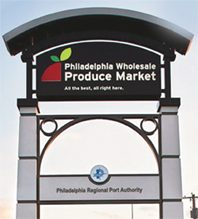For B.R.S. Produce’s Milavsky, his toughest challenge in the past year “were large increases in rent—about 2.5 times what we were paying before.” Fortunately, Milavsky says the company is doing sufficient business to overcome the additional costs. The upside is convenience: “Everything else is much more convenient and easier to work with.”
A Reason To Look Forward
Though weather patterns become more erratic and fuel prices seem to increase each year, Philly’s merchants remain optimistic about the future of the market.
“More people are eating healthy, trying to eat fresh fruits and vegetables because of all the good publicity from nutritionists,” says Quaker City’s Storey. “The Obamas tell people to eat healthy and eat your broccoli. Business is up. With all the free publicity we’re getting, sales only have to go up—but with the weather challenges, we may see supply issues.”
Although the PWPM’s mortgage certainly puts a strain on merchants, Curtis believes the market will pay off for everybody. “We were ahead of our time, ahead of the curve,” he says, referring to the food safety issues addressed by the unbroken cold chain at the new facility.
It cost over $300 million to build the PWPM facility—to build a comparable facility in New York or Baltimore would undoubtedly cost more. “In a year from now, even five years from now, the Philadelphia Wholesale Produce Market will still be on top of its game,” Levin predicts. “We will still be the ‘future of fresh’ for years to come.”
Levin is so confident about the “Philly Advantage,” in coming years, he expects to see more wholesalers from outside the state sending trucks to the facility.



